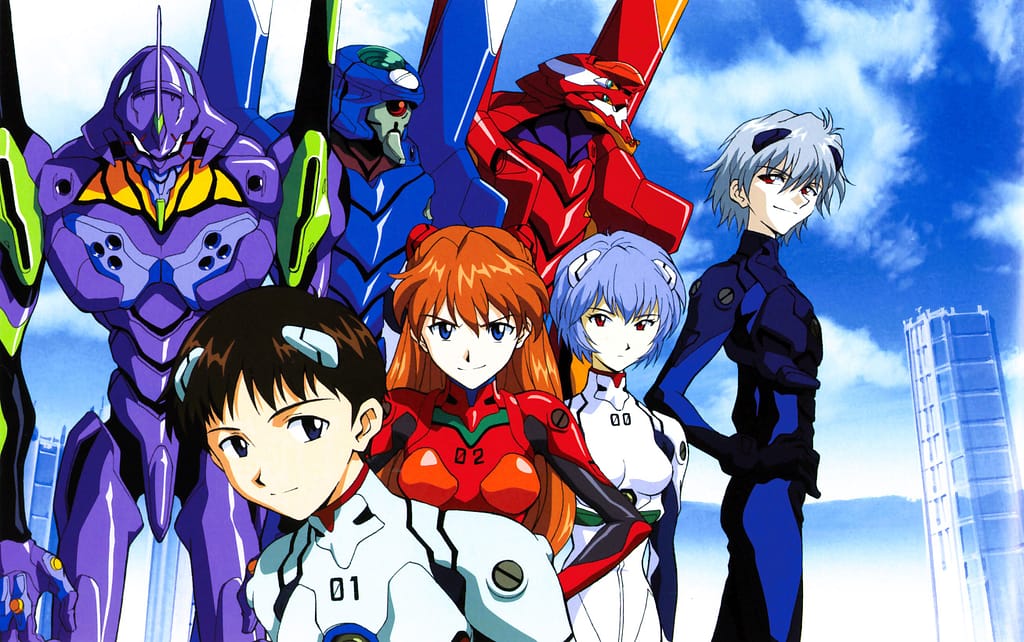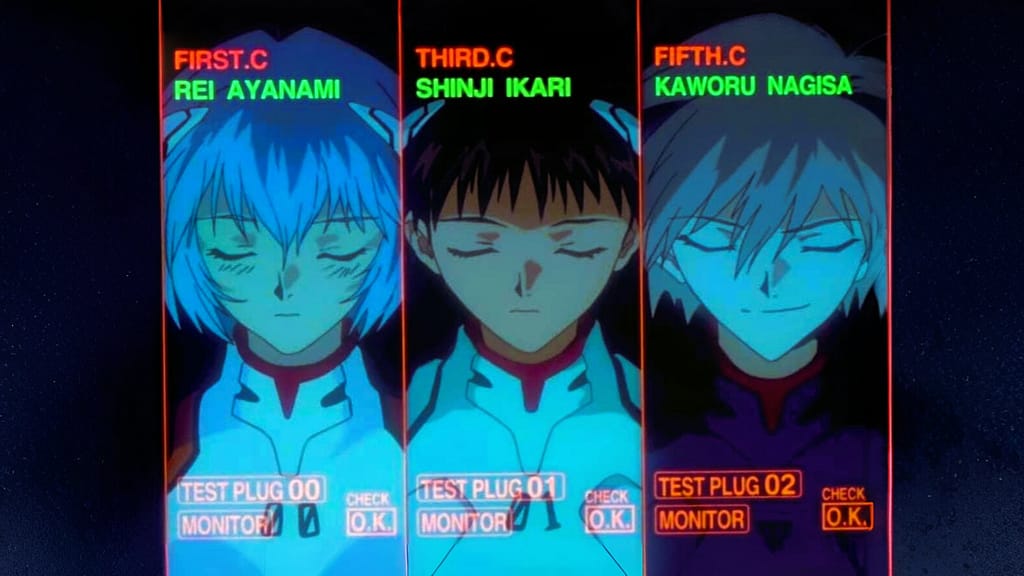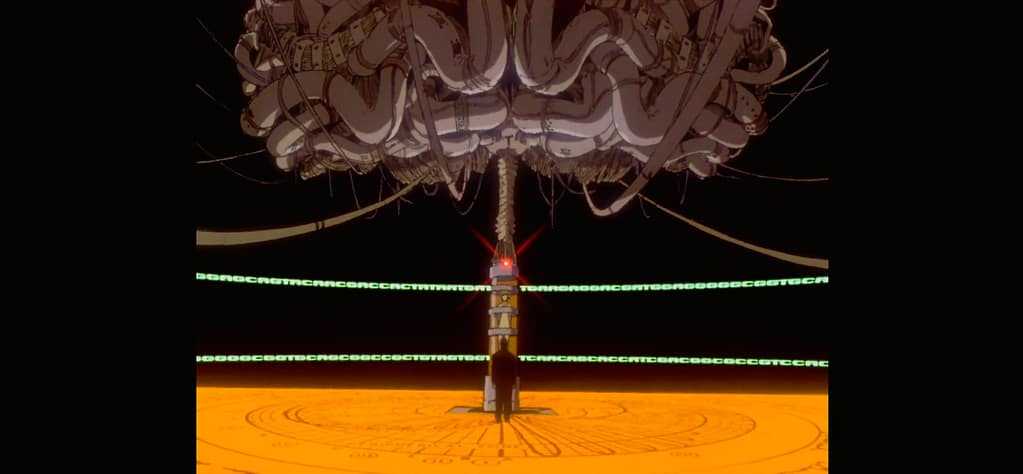Welcome Back To MovieAnimeX ! Today we are going to review one of the old gems that is still not known by many people, “Neon Genesis Evangelion.” So without wasting any time, let’s get started. But before we start, here’s a spoiler alert.

Table of Contents
1.Ratings
- MovieAnimeX:- 8.7/10
- Imdb:- 8.5/10
- Rotten Tomatoes Audience Score:- 89%
- Rotten Tomatoes Critics Score:- 100%
- MyAnimeList:- 8.35/10
2.Introduction

Although Neon Genesis Evangelion is frequently categorized as a mecha anime, this classification belies the series’ actual characteristics. In contrast to classic mecha series like Gundam or Code Geass, Evangelion focuses more on existential dread, profound psychological pain, and the frailty of the human psyche than it does on massive robot fights. The show centers on Shinji Ikari, a hesitant kid who must fight enigmatic beings known as Angels while piloting an Evangelion, a biomechanical weapon. The real struggle, though, is within the protagonists’ heads as they examine issues of trauma, loneliness, and the pursuit of self-worth.
Evangelion is notable for its daring narrative, cerebral symbolism, and readiness to challenge conventional anime clichés. Even while it is considered a masterpiece by many, it has problems. Here, we explore the series’ psychological terror components while analyzing its advantages and disadvantages.
3.What’s Good About Evangelion?

- Deep Psychological Themes – The show provides an honest and unvarnished examination of trauma, existential dread, and mental health.
- Unique Storytelling & Symbolism – Evangelion is one of the most studied anime ever because of its combination of detailed character arcs, intellectual narrative, and religious symbolism.
- Memorable Characters – Every main character has layers of psychological complexity that give them a genuine and approachable feel.
- Atmospheric Soundtrack – Important scenes are made more tense and emotionally impactful by Shiro Sagisu’s dark and scary tune.
- The End of Evangelion’s Bold Narrative – The film’s dark, provocative masterwork breaks conventional storytelling conventions in its end.
4.What’s Bad About Evangelion?
- Pacing Issues – Viewers expecting a typical action-packed mecha anime may find the early episodes dull and deceptive.
- Abstract & Confusing Ending – Without The End of Evangelion to provide context, many viewers may become confused by the series’ very abstract last two episodes.
- Depressing & Unsettling Tone – The existential crises and psychological breakdowns may be too much for ordinary viewers, but this is a strength for horror enthusiasts.
- Unresolved Plot Threads – Audiences are forced to delve deeply into hidden meanings and interpretations since so many questions remain unanswered.
5.Evangelion’s Significance Beyond Mecha Anime
Evangelion initially appears to follow a well-known pattern: youthful pilots piloting enormous humanoid robots to battle terrifying beings called Angels. But as the book goes on, it becomes clear that the protagonists’ internal conflicts—rather than those with the Angels—are the true struggles. The mechas, referred to as Evangelions, are bio-mechanical entities connected to the protagonists’ emotional states rather than conventional robots.
Shinji Ikari continues to be emotionally unstable and self-conscious, in contrast to other mecha heroes who develop into self-assured warriors. His hesitation to pilot Unit-01 is a result of his ingrained trauma and rejection anxiety, not merely a personal shortcoming. The hero’s journey is frequently subverted throughout the series, with existential dread taking the place of victory.
6.Psychological Horror Elements in Evangelion

- Existential Dread & Isolation
Evangelion delves into themes of loneliness and the human psyche. The ‘Human Instrumentality Project’ is a horrifying concept aimed at eliminating individuality by merging all human souls into one entity. This fear of losing one’s identity is a core element of psychological horror. - Mind-Breaking Character Arcs
Each major character in Evangelion represents different forms of psychological trauma:- Shinji Ikari – Suffers from abandonment issues and a desperate need for validation.
- Asuka Langley Soryu – A narcissistic persona masking deep-seated insecurity and trauma from childhood neglect.
- Rei Ayanami – A mysterious existence struggling with the concept of selfhood.
- Misato Katsuragi – Uses relationships as a means to fill emotional voids left by her past.
- Disturbing Imagery & Symbolism
Neon Genesis Evangelion is filled with unsettling imagery that enhances its psychological horror:- The Evangelions, when damaged, scream in agony, emphasizing their organic nature.
- The Angels’ designs are surreal and grotesque, often resembling distorted biblical beings.
- A disturbing sequence where Asuka’s mind is forcibly invaded, leaving her in a state of psychological collapse.
- Gendo Ikari’s manipulations, which feel like a cosmic horror narrative where humans are mere pawns.
- The Anxiety-Inducing Soundtrack
Shiro Sagisu’s score is not about high-energy battle themes but eerie, unsettling orchestration that elevates the tension. Scenes are often accompanied by unsettling silence or distorted audio, making viewers uncomfortable.
7.The End of Evangelion – True Horror Unleashed
In The End of Evangelion (1997), Neon Genesis Evangelion completely embraces psychological horror, whereas the previous series was a gradual slide into lunacy. The film is notorious for its grim philosophical overtones, existential terror, and gruesome visuals.
Unsettling images, bodily horror, and intense psychological suffering abound in this abstract, terrifying depiction of the world-ending scene. Effective psychological terror is characterized by Shinji’s final decision to renounce Instrumentality and embrace individuality, which makes spectators wonder about their own life.
8.Conclusion
Despite its apocalyptic conflicts and enormous robots, Neon Genesis Evangelion is fundamentally a masterwork of psychological terror. It differs from conventional mecha anime in that it examines existential dread, trauma, and the frailty of the human psyche. Evangelion is the pinnacle of psychological horror anime in disguise for those looking for a profound, unnerving experience that lasts long after the credits have rolled.